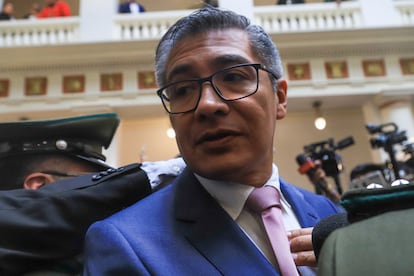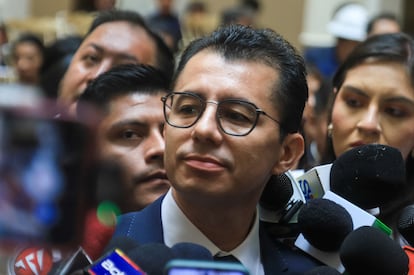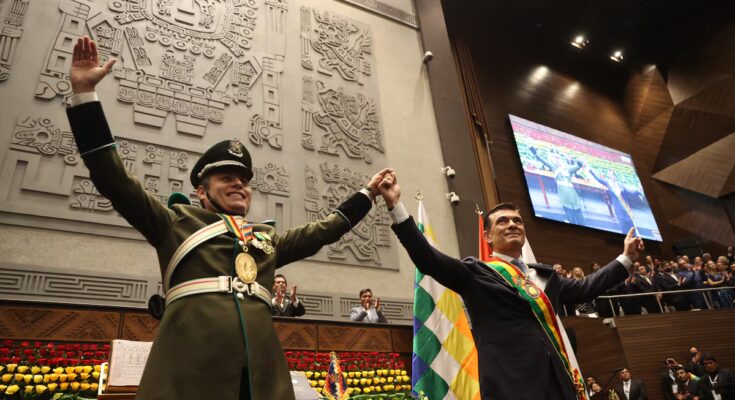Farmer leaders and trade union leaders have given way to experienced businessmen and civil servants. Him recently assumed president of Bolivia, Rodrigo Pazannounced his first ministerial cabinet on Sunday, which renounces social sectors and organizations that They have ruled the country for the last two decades. Rather, profiles linked to large agricultural exporters and former politicians from the so-called neoliberal period in Bolivia (1985-2006) predominate. “Surely someone will say ‘where are the sectors?’. For 20 years they have been represented. I want to ask where are the gas and lithium,” defended the president, at an event held at the Palacio Quemado in La Paz.
Paz has appointed 15 ministers, four fewer than in the previous government of Luis Arce (2020-2025), of the Movement towards Socialism (MAS). The cut was lower than assumed, but important portfolios such as the Environment and Mining ones were sacrificed. The president assured that he had made the selection based on “meritocracy” and favoring a technical profile; However, there are other common denominators, such as support for the private sector and the reinstatement of former Conservative ministers.
This is what the editor-in-chief of the Bolivian newspaper claims. OpinionSantiago Espinoza: “The Education portfolio has historically been like a spoil of the urban-rural teaching profession, a highly politicized sector. Now we see a woman (Beatriz García) who does not come from there; she is in fact a business administrator linked to empowerment processes.” Since the government of the National Revolution of 1952, workers’ and mining associations have intermittently been part of the Bolivian Executive as a strategy for resolving social conflicts. Former Aymara president and co-founder of MAS, Evo Morales (2006-2019), He recovered that relationship to catapult himself and remain in the presidential seat.
In recent years, portfolios such as Work, Rural Development or Culture have been occupied by representatives of the National Confederation of Indigenous Peasants Bartolina Sisa, the Trade Union Confederation of Intercultural Communities or the Trade Union Confederation of Peasant Workers, organizations that have disappeared from the new government team. “One could justify its absence in technical terms, but in political terms it is a risk, because the ability to negotiate and dialogue with demanding sectors will be fundamental. It is something that is already institutionalized in Bolivia: you cannot govern without having one foot on the street. Social organizations have a lot of power“says Espinoza.

Paz claims he gave up that support because Morales and Arce’s “methodology” for choosing their cabinets “didn’t work.” Blame those governments worst economic growth recorded by Bolivia this century and double-digit inflation caused by a dollar shortage. Furthermore, several union ministers were involved in disputes and corruption cases. The new head of state has decided to bet on the representatives of the groups he believes are capable of alleviating the crisis in the short and medium term, such as agribusiness.
The new Minister of Productive Development, Óscar Justiniano, was until recently president of the Federation of Private Entrepreneurs of Santa Cruz, the economic capital of the country. The one from Development Planning, José Romero, presided over the Association of Oilseed and Wheat Producers, while the one from Public Works, Mauricio Zamora, owns businesses related to viticulture and hospitality. Peace entrusted them to follow the four lines he promises for his mandate: “openness to the world, capitalism for all, end of the State bar and start a new state starting from regional autonomies”.

Bolivia, the president observed, “is about to receive a huge amount of resources from abroadand the willingness to invest depends on us: we must give Bolivians access to those dollars and those investments”.
Professor and Doctor of Political Philosophy Óscar Gracia assures that the meritocracy to which Paz alludes is a political value associated with center-right governments. “The technocratic profile of the government speaks of a return to more traditional forms of state bureaucracy. The MAS previously relied on political loyalty and symbolic meaning.”
This return to old ways of governing, especially those of the neoliberal phase, includes some of the most influential names in government. The Minister of the Presidency, José Luis Lupo, held various ministerial positions between 1991 and 2002, while the Minister of the Government (Security), Marco Antonio Oviedo, was Secretary of the Interior during the mandate of Jaime Paz Zamora (1989-1993), father of the current president, who did not hesitate to provide him with his old weapons.



